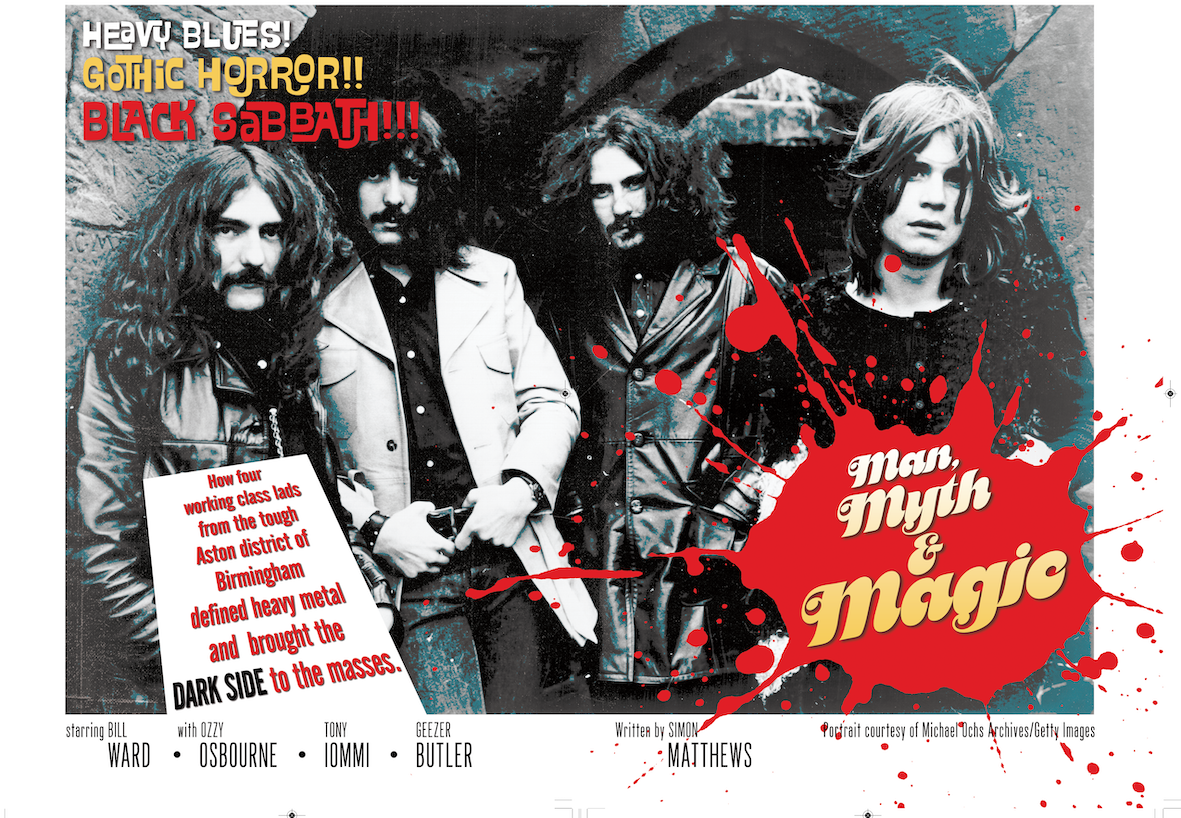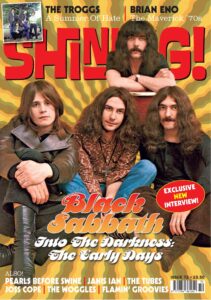Shindig! Issue #72 – Black Sabbath
RIP Ozzy Osbourne! We loved ya. Here’s an extract from our Sabbath cover in issue #72, which you can all order in glorious print here.

Despite minimal airplay and little critical acclaim, Black Sabbath entered the UK LP charts on 7th March 1970, and eventually reached #8, going gold, with a 10-month chart run. Geezer Butler was later to recall that the band heard of the record’s arrival in the charts when listening to Top Gear whilst on the way to a gig. John Peel’s role in their ascent was acknowledged by Osbourne after the deejay died in 2004. “He was a pioneer in his own right. If it wasn’t for John Peel, Black Sabbath would never have been played on the radio. He was a good guy.” But even Osbourne was taken aback by the success. “Jim Simpson comes up to me and says, ‘I’ve got some news to tell you.’ And I go, ‘What’s that?’ And he goes, ‘Your album enters the British charts at #17 next week.’ And I go, ‘Fuck off, you’re winding me up. No way.’ ‘No, it’s true.’ And that was it. And the first Black Sabbath album stayed on the charts for quite some time. I was like, ‘Why?’ It was such a great surprise.”
Perhaps, and any act enjoying this might be surprised. But, by early ’70 a similar format from Blue Cheer and Iron Butterfly had already cleaned up in the US, so the chances of a heavy-blues album of this type following suit in the UK must have been reasonable. Today, Bill Ward considers, “The success of the debut LP was overwhelming, but I think what set us apart was our lyrical uniqueness. Other bands were still basically doing boy meets girl stuff. I still think it’s absolutely incredible. It’s naïve and there’s an absolute sense of unity – it’s not contrived in any way, shape or form. We weren’t old enough to be clever. I love it all, including the mistakes!” More prosaically, Geezer Butler remembers, “We didn’t think it’d ever do anything.”
The day after wowing everyone at Newcastle-under-Lyme they were on German TV’s Beat Club, racing in their Commer van (maximum speed 65 mph) from Staffordshire to Bremen via The Hook Of Holland to appear alongside Rare Bird, Blodwyn Pig, Renaissance and Canned Heat. Sabbath was filmed doing two numbers – ‘Blue Suede Shoes’ and ‘Black Sabbath’. Did they really do the Perkins/Presley hit? Bill Ward: “Yeah! Doing ‘Blue Suede Shoes’ was an icebreaker. All bands have them. It’s the way you relax!”
By now their album was out, on Warner Bros Record, in the US and Canada where it hit #23 in the Billboard charts, remaining there for 65 weeks and going gold. The US press blurb repeated the line that sold the band in the UK: “They’re from Birmingham, England. It’s a rough town. Their first album shows it – tough, stark, uncompromising rock.” As in the UK it sold heavily but was panned by critics, Lester Bangs (in Rolling Stone) referring to “discordant jams with bass and guitar reeling like velocitised speed freaks all over each other’s musical perimeters, yet never quite finding synch.” The combination of scorn in the music press, (comparative) lack of airplay and huge sales rather reminds one of Grand Funk Railroad. But with everything going platinum (like GFR) who was bothered about the critics and airplay? If Sabbath spoke to the teenagers of Silloth, Maryport and Dumfries they also did – big time – to the millions of would be adolescent guitar heroes across the US Midwest.
To capitalise on their chart success, the band returned to the studio in June ’70, to record their second album. Dallying with political protest this was due to be named War Pigs after a track that was critical of The Vietnam War. Careful to preserve US sales, Warners nixed the idea and insisted it was changed to Paranoid after the tie-in single, written in the studio at the last minute. Ward explains. “We didn’t have enough songs for the album, and Tony just played the guitar lick and that was it. It took 20, 25 minutes from top to bottom.” The single was released in September and reached #4 in the UK and #1 in Germany. At two minutes 43 seconds it was short, fast and concise and unlike anything else Sabbath did, with semi-shouted/spoken lyrics and four chords. Like skiffle before it, this was something a 13-year-old given a guitar for their birthday or Christmas could imagine themselves mastering. The album followed in the UK in October ’70, where, pushed by the success of the ‘Paranoid’ single, it made #1.
From hereonin music industry momentum took over. The ’68 drug convictions of Iommi and Ward having expired and visas being readily available, Black Sabbath toured the United States for the first time from October ’70 with the US release of Paranoid being held off until January ’71, as the first Black Sabbath album was still in the charts when the follow-up appeared in the UK. It duly reached #12 in the US in March ’71, spending 70 weeks in the charts, and went quadruple platinum despite virtually no airplay. If Vertigo were hoping for a string of hit singles they were disappointed, as Bill Ward said, “We didn’t really take to having a hit single,” adding, “I first thought we were beginning to make money when we did a gig in Nottingham and got paid £100. £25 each (£600 today) was a lot then. And we were doing several gigs per week. When the albums hit, we all got houses and cars and stuff like that: but we had to ask our management to advance the amounts we needed to us. The really serious money came later.”
Order issue #72 here


